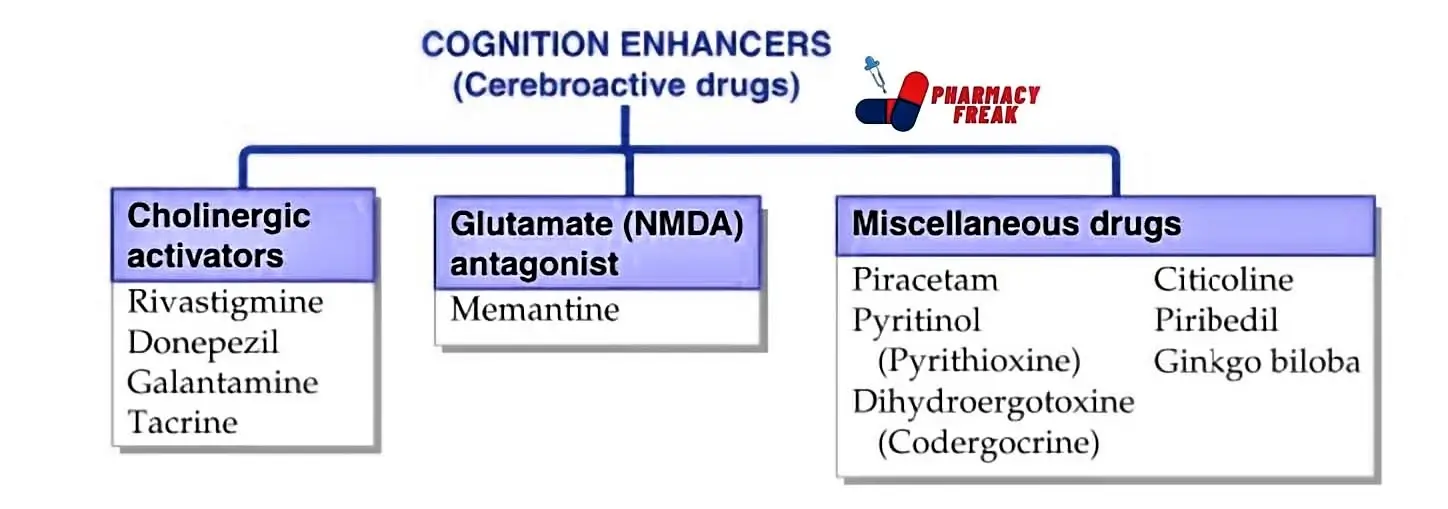Cognition enhancers, often referred to as nootropics or smart drugs, are substances that some people use to boost cognitive functions like memory, focus, creativity, and motivation. They are often taken to improve productivity, academic performance, or cognitive abilities in various situations. However, it’s essential to note that while some cognition enhancers are well-researched and safe, others lack scientific support and may have potential risks.
Table of Contents
Classification of Cognition Enhancers
Cognition enhancers can be classified into different categories based on their mechanisms of action and effects. Here are some common types:
- Cholinergic activators- Rivastigmine, Donepezil, Galantamine,Tacrine
- Glutamate (NMDA) antagonist- Memantine
- Miscellaneous drugs– Piracetam, Pyritinol (Pyrithioxine), Piribedil, Dihydroergotoxine(Codergocrine), Ginkgo biloba, Citicoline
- Cholinergics:
- These enhancers work by affecting the cholinergic system, which involves the neurotransmitter acetylcholine. Acetylcholine is essential for memory and learning.
- Common substances include choline, alpha-GPC, and racetams like piracetam.
- Amphetamines and Stimulants:
- This category includes substances that stimulate the central nervous system, increasing alertness, energy, and concentration.
- Well-known stimulants include amphetamines like Adderall and methylphenidate (Ritalin).
- Adaptogens:
- Adaptogens are natural substances that help the body adapt to stress and promote mental clarity.
- Popular adaptogens include rhodiola rosea, ashwagandha, and ginseng.
- Nootropic Nutrients:
- These enhancers provide essential nutrients that support brain health and function.
- Examples are omega-3 fatty acids, B vitamins, and antioxidants like vitamin C and vitamin E.
- Herbal Nootropics:
- Herbal cognition enhancers are derived from plants and herbs and have been used in traditional medicine for cognitive enhancement.
- Some popular herbal nootropics include ginkgo biloba, bacopa monnieri, and Panax ginseng.
Common Cognition Enhancers
Let’s explore a few common cognition enhancers:
- Caffeine:
- Found in coffee, tea, and some supplements, caffeine is a stimulant that enhances alertness and concentration.
- L-Theanine:
- Often found in tea, L-theanine is known for its calming effect, reducing anxiety while maintaining alertness.
- Modafinil:
- A prescription medication used to treat sleep disorders, modafinil promotes wakefulness and increased cognitive function.
- Lion’s Mane Mushroom:
- This medicinal mushroom is believed to support cognitive function and nerve cell health.
- Bacopa Monnieri:
- An herb used in traditional medicine, bacopa may improve memory and cognitive function.
Using Cognition Enhancers
If you’re considering using cognition enhancers, it’s essential to do so responsibly. Here are some guidelines:
- Consult a Healthcare Professional: Before trying any cognition enhancers, consult with a healthcare provider, especially if you have underlying health conditions or are taking other medications.
- Start with Low Doses: Begin with lower doses to assess your body’s response and potential side effects.
- Be Informed: Research the substance you plan to use. Ensure it has scientific backing and is safe for consumption.
- Avoid Dependency: Use cognition enhancers as tools, not crutches. Avoid becoming reliant on them for daily functioning.
- Stay Hydrated and Get Enough Sleep: Proper hydration and adequate sleep are fundamental for cognitive function. Enhancers work best when you’re well-rested and nourished.
Reference
- Classification of Progestins- KD Tripathi
- National Library of Medicine- Cognitive enhancers (nootropics). Part 1: drugs interacting with receptors
Related Links

I am a Registered Pharmacist under the Pharmacy Act, 1948, and the founder of PharmacyFreak.com. I hold a Bachelor of Pharmacy degree from Rungta College of Pharmaceutical Science and Research. With a strong academic foundation and practical knowledge, I am committed to providing accurate, easy-to-understand content to support pharmacy students and professionals. My aim is to make complex pharmaceutical concepts accessible and useful for real-world application.
Mail- Sachin@pharmacyfreak.com

